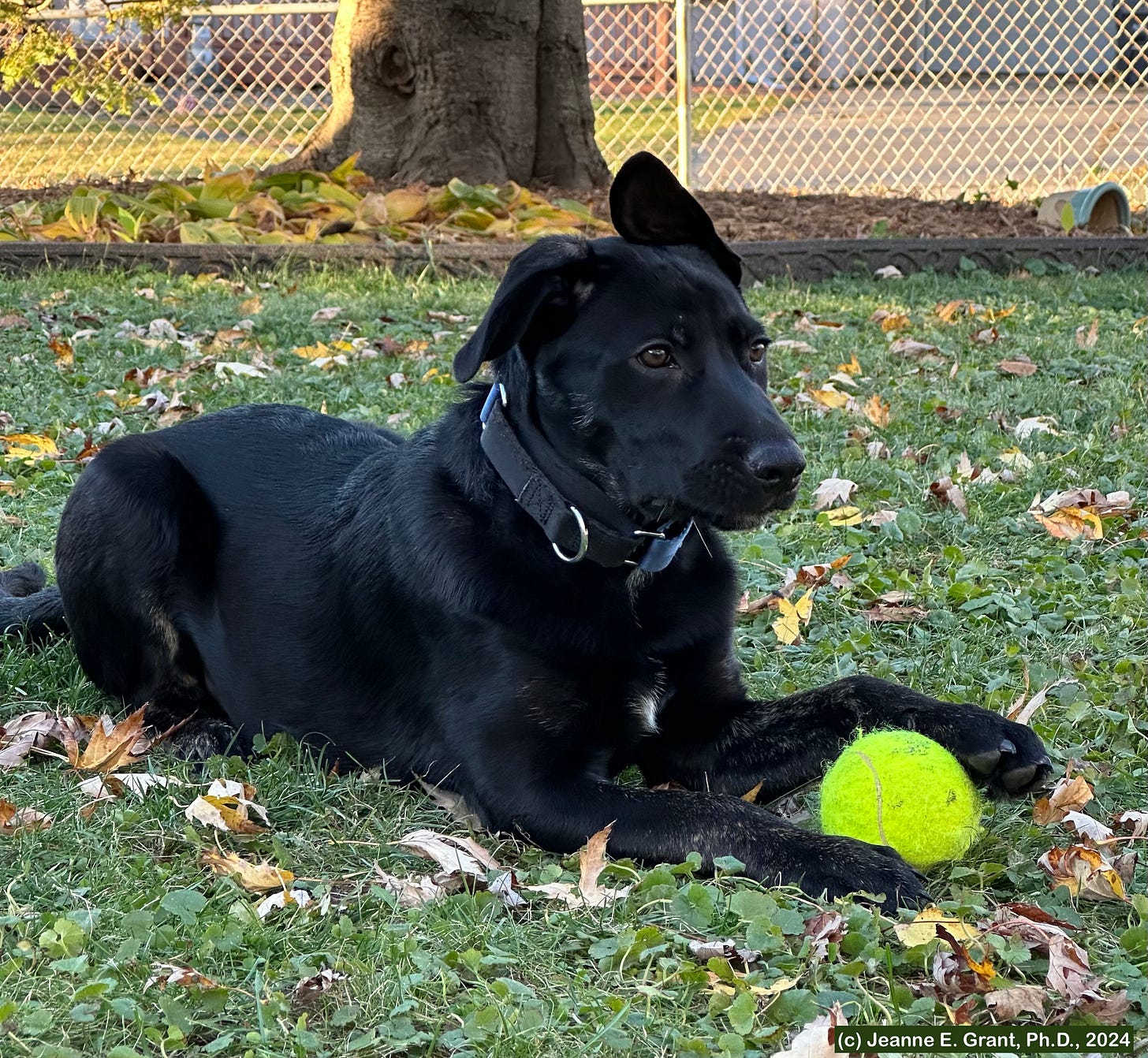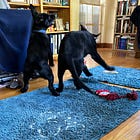This is a continuation of my process of grieving and accepting reality that I’ve been going through since my beloved dog, Ande, died in September, just two months ago. The previous post is here, and it can lead you to the post before that, where I talk about Ande’s death, in case you want to catch up.
In the puppies’ time
Both of my foster dogs were adopted. One dog I watched leave my house willingly: she happily embraced her new “mom” and I happily knew a good life awaited her.
The other dog is staying in my home permanently. Some call that a “foster fail,” but when you fall in love, you fall in love, and that is never failure.

I fostered them since near the beginning of October. I lost control of my time. Two puppies (roughly 3-4 months old) occupy your time both when they’re awake and when they’re not, because the puppy-proofness of the house needs to be improved while they recharge in their kennels. You think you have the right gates, the right rugs, the right towels in the right place, but you don’t know until they’ve been puppy-tested, and the puppies will always find a way to unprove the proofness. Everything was happening on the puppies’ schedule. And sometimes that meant I did not get enough sleep.
Brittney (named after Britney Spears, because the huge litter from which they came were all named after pop stars) struck me as independent and slightly more brave than her brother, Usher, whom I soon started called “Uša” (pronounced (“Oosha”), because I couldn’t bring myself to yell “Usher” in the yard and because “Uša” can be stretched to mean “ear” in Czech. The ears on these dogs move and seem to function like rabbit ears on old TVs, which is appropriate, because I am told that “Uša” in Japanese means “bunny,” as in “bunny ear.” The universe has colluded to name this dog.

Uša’s personality came into its own after Brittney left. He has earned nicknames: “Brave Sir Robin,” as I explained in the previous post, and “Mr. Wriggler,” for obvious reasons and the worst being that it is impossible to trim his nails. I managed to trim Brittney’s before she left the house (a point of pride for me), but Uša’s continue to grow. We will trim them somehow. He is a natural fetcher and balls figure prominently in his daily routine. Outdoor balls, indoor balls, and “under balls.” Cat-like, he enjoys pushing balls under couches, bookcases, or under this one filing cabinet where the ball can’t go too far, where it is obtainable yet not easily obtainable—see this video.
In my own time
To talk to some people about Substack is to be pulled into a conversation about the algorithm, what it wants, how to please it, and how to maximize numbers. “You have to post at least this and that often and you have to put out that many Notes on this schedule.” I love Substack but I don’t want a new master. I’m sorry, dearest readers, but I am putting humanity first, my humanity first of all, because I have feelings to feel and thoughts to think and actions to take. In my own time.
So I haven’t been posting every week. I’m a little surprised that I’ve posted once a month, just as Ande died and after. If I post, it’s going to have to be because I have something to share. As Søren Kierkegaard famously wrote, “Life must be understood backwards, but it must be lived forwards.” A longer translation captures better how I’ve been feeling: "It is really true what philosophy tells us, that life must be understood backwards. But with this, one forgets the second proposition, that it must be lived forwards. A proposition which, the more it is subjected to careful thought, the more it ends up concluding precisely that life at any given moment cannot really ever be fully understood; exactly because there is no single moment where time stops completely in order for me to take position [to do this]: going backwards."
We are constantly living forwards and cannot stop to understand backwards what our life means. The puppies kept pulling me forward and I wanted to hold on to Ande. I still do. I still will. One thing that has become clear is that as I love Uša, I continue to love Ande. In the transitive property of love, especially with pets, loving your current pet means giving love to all the pets you’ve ever had. It has to.
Another thing that has become crystal clear to me from my experience fostering is that the humans are as important to support as the other sentient beings. I’ve volunteered for two rescue organizations now, Rescue Network and This Old Horse, and that’s hardly a large enough sample size and so what I’m about to say probably says more about me than these organizations, because they are both certainly doing wonderful work for animals, but…I wonder if it isn’t easy for volunteers and workers to fall into martyrdom. A consistent vibe, a consistent message is that the animals’ needs are more important than the humans’, as I observed volunteers take on multiple dogs with dire needs, or comments similar to “how could anyone give up on a dog—I could never give up no matter what,” or pressure to take just one more animal.
There is no doubt that these animals rely on humans to save them because humanity has let them down. Overbreeding, etc., etc., has led to animals with dire needs and I am grateful to humans who step up and try to reverse the situation for an animal. So grateful that I don’t want the humans’ needs to be ignored, either. Humans can speak for themselves so it is up to the humans to decide how many rescue animals they can handle, but I wonder if there’s something in the rescue culture that leads many humans to think that more is the only better, that they are doing more good only by taking on more and more animals. If you can scale up, please scale up, but there is more than quantity to take into consideration. There is also quality. (Why I know this about me and not the organizations is because I’ve written about this before.)
When I first wrote the “ABOUT” for A Good Spot here on Substack, I was envisioning possibility, and I included humans in the list of animals that could benefit from being at A Good Spot. I didn’t know precisely how humans might benefit when I wrote that, but I just had a sense that humans couldn’t be left out of the equation. And now I have confirmation after reflecting on my experiences with just two rescue organizations. The best experience I had with these organizations was when someone took the time—a whole evening—to converse with me and we figured out how I can best contribute to the organization’s goals. I knew the why and the how of my contributions, and I knew they were within my capacity. Every good rescue knows to know and support and build up its rescued animals. Know and support and build up the humans, too.
I write this to remind myself going forward, whenever I do manage to build the physical A Good Spot, to build the human community as much as the animal one. We all need saving.
Adopt, don’t shop!
According to Best Friends Animal Society, “if 6% more Americans chose to adopt versus purchase pets, all U.S. shelters would be no-kill.” I can’t verify that statistic, but it is certainly true that you will get as good a companion from a shelter as from a breeder, so please, find a rescue, a shelter, a humane society near you, and see who is waiting.
Finally…Pledges to A Good Spot
Please, consider pledging to this substack, A Good Spot, as it would be greatly encouraging and well, simply, AWESOME. Click here to learn more about A Good Spot and its long-term goals.





I am so sad for your loss. My Leila crossed the rainbow bridge on September 13, 2024. I am still broken, I know life will never be the same again. At my age I will not adopt and raise another pup since the pup will outlive me. I am grateful and happy to share my son and daughter in law’s two young dogs by taking care of them while the kids are at work. These 2 young dogs were rescued from Mexico , brought to WA state and adopted in January 2022. They adore their Grandma 😌. Thank you for sharing and I look forward to hearing more of Good Spot and your plans for this sanctuary. ❤️❤️
You are so wise to see the need to build the human community as an important value in saving animals.